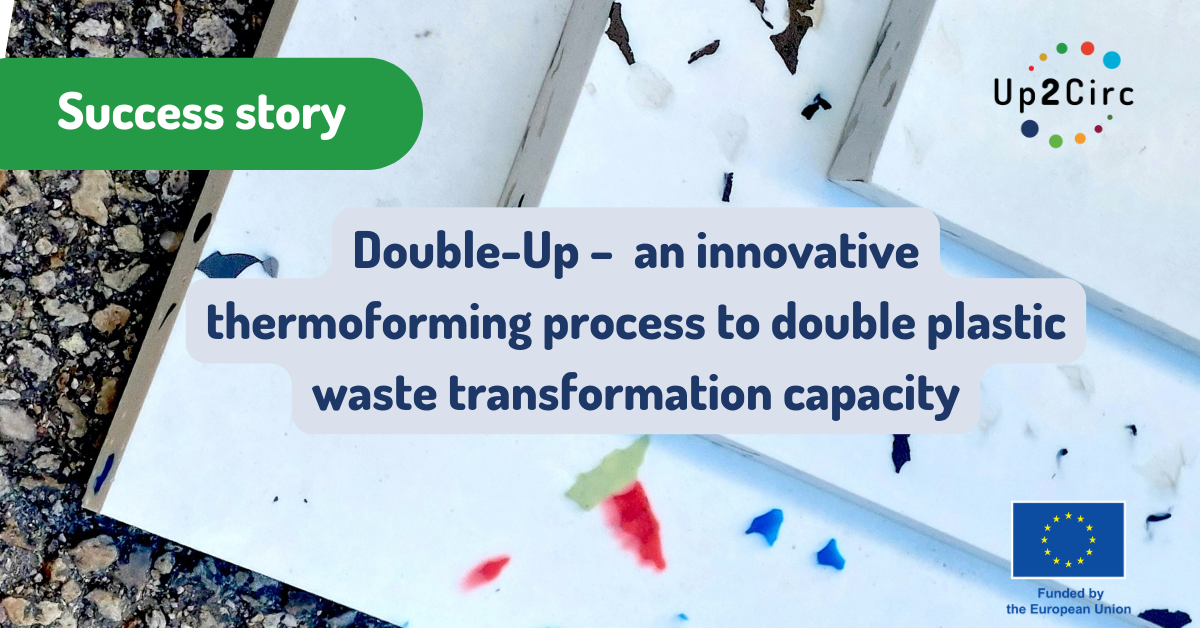A project to add new value from post-consumer and industrial plastic waste, turning it into a new and durable material with manifold applications in architecture and design.

SECTOR
Plastics/Recycled materials
CHALLENGE
Every year 400 millions of tons of plastic waste are produced worldwide, with almost 80% of it ending up polluting our land and oceans (source: unep.org). Of the 7 bln tons of plastic waste generated globally so far, less than 10% has been recycled, and it is incredible to think that the great majority of the plastic produced from the 1950s to today still exists in this world in some form, in landfills or dispersed the nature, as it takes hundreds of years to degrade and even then, it never fully disappears.
Moreover, our main target market – the furniture industry – is a major consumer of natural and non-renewable materials, but the use of certified sustainable materials has increased by 200% since 2011 (source: Sustainable Furnishings Council).
Recycled and renewable materials are favored because they can be repurposed or recycled again, reducing the industry’s global environmental impact.
SOLUTION
Plastiz creates new value from post-consumer and industrial plastic waste, turning it into a new and durable material with manifold applications in architecture and design.
In each square meter of our big-sized panels (3 sqm each) we inglobate on average 15 kg of plastic scraps.
We focus on R&D, experimenting with thermoplastics to help companies create new circular processes that lead to new sustainable products and components. We partner up with companies and resellers to close the loop and find the most suitable application for each material, which is enriched in its value perception and narrates the history of the waste from which it is generated.
CIRCULAR ECONOMY STRATEGIES/BUSINESS MODEL IMPLEMENTED
Plastiz’s transformation process relies on the thermoforming of large quantities of plastic waste. This process is rather innovative in the plastic industry, since traditional methods of processing plastic use minimum quantities of material to produce lightweight and single use products. In our process, the granulated or grinded thermoplastic polymers are arranged on metal plates, and then brought to melting temperature and compressed in a hot press before being moved to the cooling stage. This process allows us to define the texture of the panels, so that it results in a unique surface in terms of aesthetic and visual impact.
Large-format plastic thermoforming machines for this specific process do not exist on the market, so we had to build our own from the guidelines provided by Precious Plastic, an international open source project which aims to sensitize communities on recycling plastic waste.
IMPACT
With our state-of-the-art production, which is yet rather small, in 3 years we recycled more than 20.000 kg of plastic waste from soap bottles, caps, spools, coffee capsules and more, providing materials that were used for countertops, tables and design objects in 27 retail spaces and restaurants, 2 exhibitions spaces and 1 office. These numbers translate into 35.000 kg of petrol saved and 50% fewer greenhouse gas emissions in comparison to the production of new virgin plastic material (source: Sirmax).
KEY TAKEAWAY
Our goal within the scope of the “Double-Up” project was to optimize the overall production process in order to double the production, and therefore (at least) double our environmental and social impact.
With our newly increased production capacity, we are now focused on expanding our commercial reach through a structured sales development plan for 2025, supported by targeted marketing and communication efforts. To sustain this growth, we are actively seeking a strategic partner or investor to co-develop a second production line, enabling further scale-up and reinforcing our impact on sustainable material innovation.
Furthermore, another key outcome of the project has been the final validation of our innovative plastic waste transformation process, which has the potential to be expanded to other waste streams, further strengthening our contribution to the circular economy.
